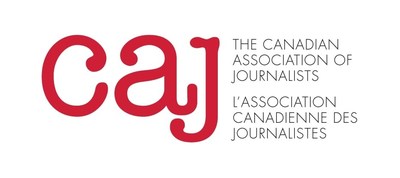CAJ calls on courts to limit RCMP powers when granting injunctions
TORONTO, May 18, 2021 /CNW/ - The Canadian Association of Journalists (CAJ) is respectfully calling on courts to limit the powers of the RCMP, and other police agencies, when issuing injunctions. This call comes after the RCMP temporarily blocked media access to the Fairy Creek watershed, near Port Renfrew, B.C., yesterday as police were set to enforce an injunction and remove demonstrators who have been blocking logging of an old-growth forest since last summer.
"The RCMP and other police agencies have failed to respect the Charter of Rights and Freedoms when executing injunctions," said CAJ president Brent Jolly. "Since they have not shown an ability to handle the powers, the only solution we can think of is to respectfully ask the courts to limit those powers."
The key problem stems from a clause typically included in most injunctions which gives police broad discretionary powers to detain or arrest anyone violating the order or interfering with police actions. In spirit, the clause is meant to allow police to remove demonstrators who are the subject of the injunction. However, the police have repeatedly used the cause to deny access to journalists, to arrest them, or detain them.
On April 1, 2021, the B.C. Supreme Court granted an order allowing RCMP broad powers to enforce an injunction prohibiting the obstruction of logging by Teal-Jones, a Surrey-based forestry company. On Monday evening, multiple journalism outlets contacted the CAJ to say they were heading out to cover the story and discovered the RCMP had set up a checkpoint at the McClure Forest Service Road. Officers at the checkpoint blocked reporters from accessing the protest site. One of the journalists was a member of the CAJ board and recorded the conversation.
Earlier the RCMP had issued a press release promising "reasonable efforts will be made to provide recognized media outlets access to the enforcement area." After contacting the RCMP to express its concerns, the CAJ was told late Monday night that journalists would be allowed access to the site if they returned.
The CAJ is monitoring the press freedom situation on the ground. If you're a journalist and police interfere with your ability to report from the Fairy Creek watershed area, please contact us immediately.
"Unfortunately we are seeing a repeat of past behaviour whereby the RCMP, and other police forces, have violated basic civil liberties and blocked journalists' access to a site where they were enforcing an injunction against demonstrators," said Jolly. "It's becoming a disturbing pattern, and perhaps, the only way to stop it is to ask the court to clip their wings."
Journalists' rights to be present at demonstrations, even when an injunction is in place, and the demonstration takes place on private property, were reaffirmed by the Court of Appeal of Newfoundland and Labrador, the province's highest court on December 12, 2017, in the Justin Brake Case.
Despite this victory, the RCMP has continued to block, detain and harass journalists as they try to cover the enforcement of injunctions.
Last September, for example, Karl Dockstader, a journalist, co-host of the podcast One Dish One Mic and co-recipient of the 2020 CJF-CBC Indigenous Journalism Fellowship, was arrested and charged with mischief, and failure to comply with a court order while covering a land dispute between citizens of Six Nations and a development company. The case never made it to court and all charges were dropped.
In February 2020, filmmaker Melissa Cox was arrested while covering a railway blockade at New Hazelton, B.C., held in solidarity with Wet'suwet'en hereditary chiefs who disputed a natural gas pipeline project in their territory. The judge threw the case out of court.
The Civilian Review and Complaints Commission, the independent agency tasked with oversight of Canada' police force, also noted in a February 2020 report the RCMP's "blocking public access to roadways, especially when such action may have directly or indirectly unnecessarily hindered the media's ability to report on the protests, may have been unreasonable."
The Canadian Association of Journalists is a professional organization with over 900 members across Canada. The CAJ's primary roles are public-interest advocacy work and professional development for its members.
www.caj.ca | www.facebook.com/CdnAssocJournalists | www.twitter.com/CAJ
SOURCE Canadian Association of Journalists
News published on and distributed by:




